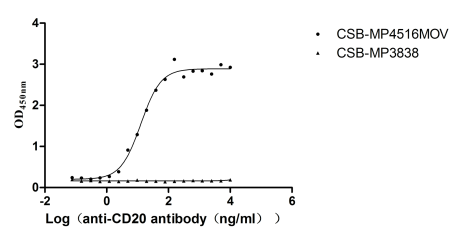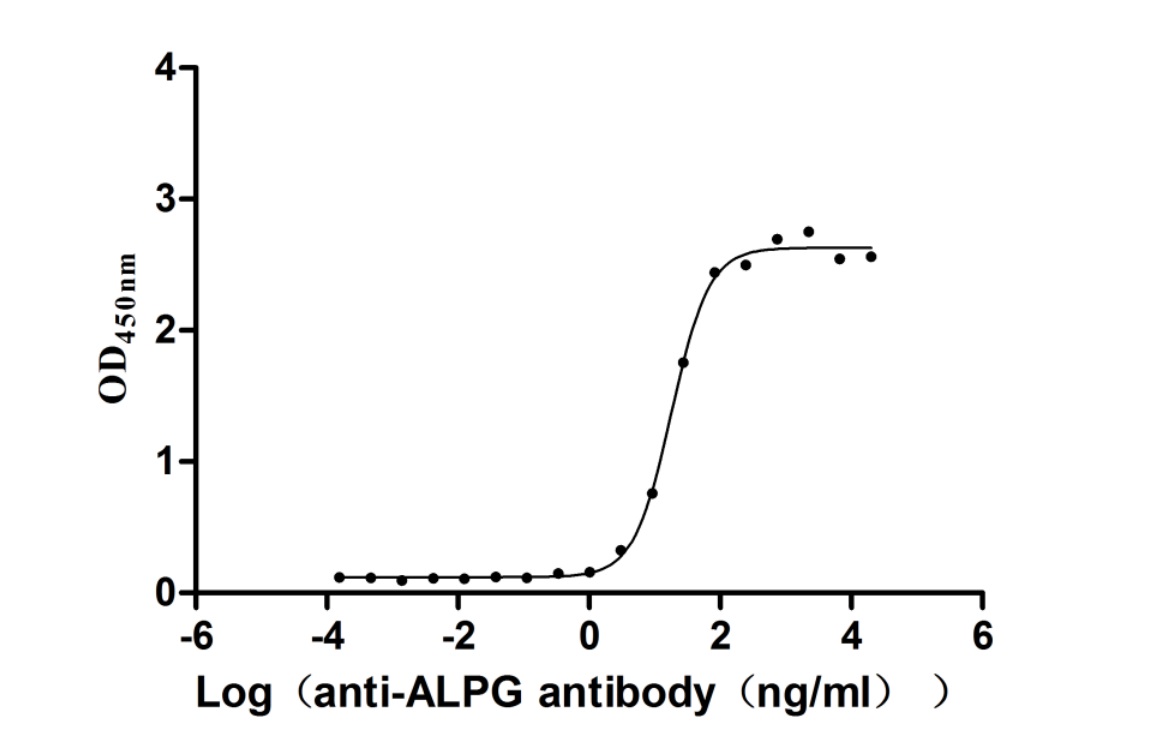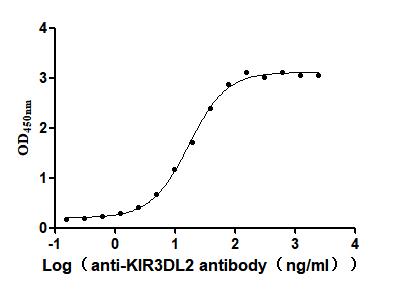Recombinant Saccharomyces cerevisiae Protein SIC1 (SIC1)
-
货号:CSB-YP327865SVG
-
规格:
-
来源:Yeast
-
其他:
-
货号:CSB-EP327865SVG
-
规格:
-
来源:E.coli
-
其他:
-
货号:CSB-EP327865SVG-B
-
规格:
-
来源:E.coli
-
共轭:Avi-tag Biotinylated
E. coli biotin ligase (BirA) is highly specific in covalently attaching biotin to the 15 amino acid AviTag peptide. This recombinant protein was biotinylated in vivo by AviTag-BirA technology, which method is BriA catalyzes amide linkage between the biotin and the specific lysine of the AviTag.
-
其他:
-
货号:CSB-BP327865SVG
-
规格:
-
来源:Baculovirus
-
其他:
-
货号:CSB-MP327865SVG
-
规格:
-
来源:Mammalian cell
-
其他:
产品详情
-
纯度:>85% (SDS-PAGE)
-
基因名:SIC1
-
Uniprot No.:
-
别名:SIC1; SDB25; YLR079W; L9449.8; Protein SIC1; CDK inhibitor p40
-
种属:Saccharomyces cerevisiae (strain ATCC 204508 / S288c) (Baker's yeast)
-
蛋白长度:full length protein
-
表达区域:1-284
-
氨基酸序列MTPSTPPRSR GTRYLAQPSG NTSSSALMQG QKTPQKPSQN LVPVTPSTTK SFKNAPLLAP PNSNMGMTSP FNGLTSPQRS PFPKSSVKRT LFQFESHDNG TVREEQEPLG RVNRILFPTQ QNVDIDAAEE EEEGEVLLPP SRPTSARQLH LSLERDEFDQ THRKKIIKDV PGTPSDKVIT FELAKNWNNN SPKNDARSQE SEDEEDIIIN PVRVGKNPFA SDELVTQEIR NERKRAMLRE NPDIEDVITY VNKKGEVVEK RRLTDEEKRR FKPKALFQSR DQEH
-
蛋白标签:Tag type will be determined during the manufacturing process.
The tag type will be determined during production process. If you have specified tag type, please tell us and we will develop the specified tag preferentially. -
产品提供形式:Lyophilized powder
Note: We will preferentially ship the format that we have in stock, however, if you have any special requirement for the format, please remark your requirement when placing the order, we will prepare according to your demand. -
复溶:We recommend that this vial be briefly centrifuged prior to opening to bring the contents to the bottom. Please reconstitute protein in deionized sterile water to a concentration of 0.1-1.0 mg/mL.We recommend to add 5-50% of glycerol (final concentration) and aliquot for long-term storage at -20℃/-80℃. Our default final concentration of glycerol is 50%. Customers could use it as reference.
-
储存条件:Store at -20°C/-80°C upon receipt, aliquoting is necessary for mutiple use. Avoid repeated freeze-thaw cycles.
-
保质期:The shelf life is related to many factors, storage state, buffer ingredients, storage temperature and the stability of the protein itself.
Generally, the shelf life of liquid form is 6 months at -20°C/-80°C. The shelf life of lyophilized form is 12 months at -20°C/-80°C. -
货期:Delivery time may differ from different purchasing way or location, please kindly consult your local distributors for specific delivery time.Note: All of our proteins are default shipped with normal blue ice packs, if you request to ship with dry ice, please communicate with us in advance and extra fees will be charged.
-
注意事项:Repeated freezing and thawing is not recommended. Store working aliquots at 4°C for up to one week.
-
Datasheet :Please contact us to get it.
靶点详情
-
功能:Substrate and inhibitor of the cyclin-dependent protein kinase CDC28. Its activity could be important for faithful segregation of chromosomes to daughter cells. It acts in response to a signal from a post-start checkpoint.
-
基因功能参考文献:
- Studies propose that Sic1, Cdc37, and Hsp82 may orchestrate parts of the cellular starvation response by regulating transcription factor- and kinase activities. PMID: 24909858
- Data indicate that Sic1 function in analogy to its human counterpart p27(Kip1), whose deregulation leads to failure in timing of kinase activation and, therefore, to cancer. PMID: 22161326
- Ime2 does not directly catalyze Sic1 phosphorylation to target it for destabilization as Cln1,-2/Cdk1 do during the cell cycle PMID: 22393365
- We analyse oscillations of B-type (Clb) cyclins, focusing on the role of their inhibitor Sic1. PMID: 21963604
- Individually weak dispersed Sic1 phospho sites engage Cdc4 in a dynamic equilibrium. The multisite nature of this interaction confers cooperative dependence on kinase activity for Sic1 recognition & ubiquitination at equilibrium. PMID: 22328159
- Sic1 regulates waves of Clbs, acting as a timer in their appearance, thus controlling Cdk1-Clbs activation. The molecular mechanism is not yet fully understood but is hypothesized to occur via stoichiometric binding of Sic1 to Cdk1-Clb complexes. PMID: 22002907
- Computational simulation revealed that an increased amount of SIC1 mRNAs lead to an amplified dispersion of Sic1 protein levels, suggesting mRNA control being critical to set timing of Sic1 downregulation and, therefore, S phase onset PMID: 21717009
- we discovered previously unrecognized levels of regulation of the Ace2 transcription factor and the cyclin-dependent protein kinase inhibitor Sic1 PMID: 21196523
- CK2 plays a role in the regulation of Sic1 activity. PMID: 16168390
- These data indicate a previously unrecognized inhibitor/activator dual role for Sic1 and put it among key molecules whose activity is regulated by their nuclear-cytoplasmic localization. PMID: 16294029
- Ime2 is necessary but not sufficient to promote Sic1 destruction during sporulation. PMID: 16776651
- CK2 phosphorylates Sic1 in vivo PMID: 16777072
- Sic1 phosphorylation provides a sharp link between G(1) cyclin activation and Clb kinase activation, but failure of Sic1 phosphorylation and proteolysis imposes a variable cell cycle delay and extreme sensitivity to B-type cyclin dosage PMID: 17483408
- Here we show that CK2 inactivation up-regulates Sic1 level resulting in severe down-regulation of Clb5-Cdc28 kinase activity. PMID: 17574209
- Accumulation of SIC1 mutated at multiple phosphorylation sites (stabilized version) led to significant DNA rereplication in the absence of normal chromosome segregation PMID: 19116279
- Data concluded that the molecule exists in a highly disordered state but displays some content in secondary and tertiary structure. The mutations S201A and S201E do not have significant effects on the conformational properties of the pure protein. PMID: 19280601
显示更多
收起更多
-
亚细胞定位:Cytoplasm. Nucleus.
-
数据库链接:
KEGG: sce:YLR079W
STRING: 4932.YLR079W
Most popular with customers
-
Recombinant Human CD226 antigen (CD226), partial (Active)
Express system: Mammalian cell
Species: Homo sapiens (Human)
-
Recombinant Human Tumor necrosis factor ligand superfamily member 8 (TNFSF8), partial (Active)
Express system: Mammalian cell
Species: Homo sapiens (Human)
-
Recombinant Human HLA class II histocompatibility antigen gamma chain (CD74), partial (Active)
Express system: Mammalian cell
Species: Homo sapiens (Human)
-
Recombinant Human Claudin-18.2 (CLDN18.2)-VLPs (Active)
Express system: Mammalian cell
Species: Homo sapiens (Human)
-
Recombinant Macaca fascicularis Membrane spanning 4-domains A1 (MS4A1)-VLPs (Active)
Express system: Mammalian cell
Species: Macaca fascicularis (Crab-eating macaque) (Cynomolgus monkey)
-
Recombinant Human Alkaline phosphatase, germ cell type (ALPG) (Active)
Express system: Mammalian cell
Species: Homo sapiens (Human)
-
Recombinant Human Cytotoxic and regulatory T-cell molecule (CRTAM), partial (Active)
Express system: Mammalian cell
Species: Homo sapiens (Human)
-
Recombinant Human Killer cell immunoglobulin-like receptor 3DL2 (KIR3DL2), partial (Active)
Express system: Mammalian cell
Species: Homo sapiens (Human)




-AC1.jpg)
-AC1.jpg)














